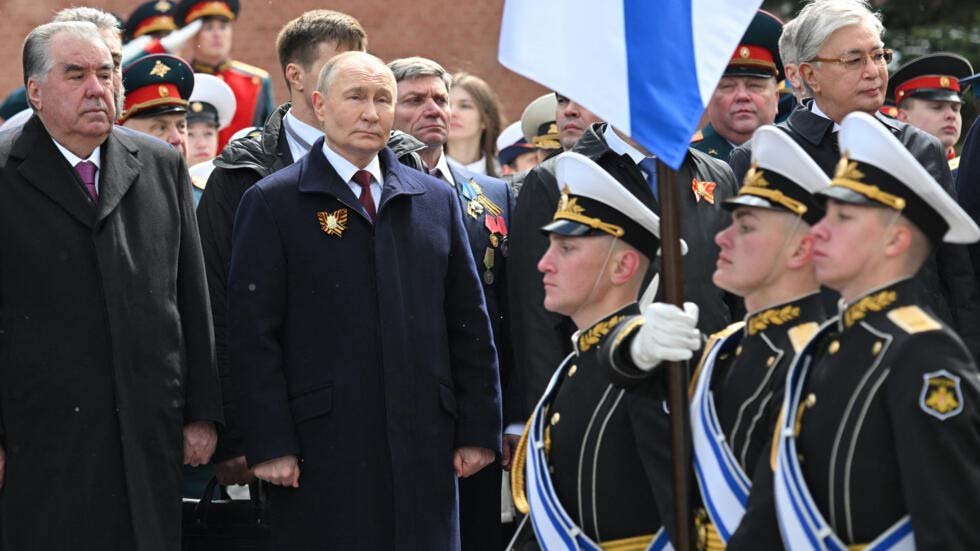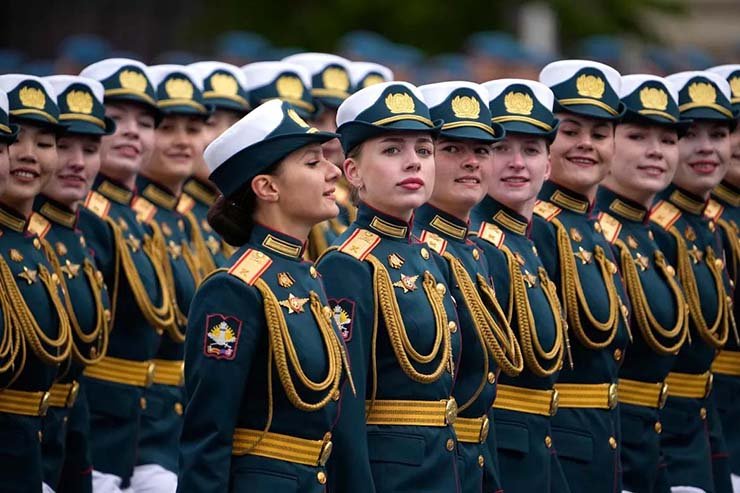
On May 9th, 2024 Victory Day, Russian President Vladimir Putin issued a warning in a speech in Moscow’s Red Square before thousands of soldiers, saying that his country would not accept any threats from the West and that his nuclear forces were ‘always’ on watch. As Putin firmly places Russia on a military footing, the May 9 parade, which commemorates the Soviet Union’s victory over Nazi Germany in World War II, has emerged as Russia’s most significant national holiday. The Russian president has described the ongoing war against Ukraine as an existential struggle against ‘Nazism’ on multiple occasions.
“Russia will take all necessary precautions to avert a world war, but we will also not tolerate threats against us. Our strategic forces are always on alert. Dear friends, Russia is going through a challenging, pivotal time,” Putin said during the Victory Day parade shortly after taking the oath of office for an unprecedented fifth term while his soldiers were making gains in Ukraine. The 71-year-old Putin, head of the Kremlin, has governed Russia since 2000.
Sixth-Time President Putin
On May 7, 2024, Vladimir Putin was sworn in for the sixth time as the president of Russia in the Hall of the Order of St Andrew, located in the Kremlin. Although the event closely resembled the five ceremonies held since 2000, it represented a crucial turning point in Putin’s leadership.
However, such technical details are of little importance to Putin. Standing at the podium in the grand hall formerly used as the royal chamber for the Tsars of Russia, Putin placed his hand on a meticulously crafted edition of the Russian constitution. When taking the oath, he pledged to uphold and safeguard the rights and freedoms of individuals, defend the constitution of the Russian Federation, preserve the sovereignty and independence, security and unity of the state, and faithfully serve the people. Over almost thirty years, Putin has gradually diminished the rights, freedom, and protection of the Russian population while also modifying the constitution to serve his interests. As a result, these promises appeared incredibly insincere.
After succeeding President Boris Yeltsin in 1999, Putin has transformed Russia from a country emerging from economic collapse to a pariah state that threatens global security. Following the 2022 invasion of Ukraine, which has become Europe’s most significant conflict since World War II, Russia has been heavily sanctioned by the West. Russia is turning to other regimes such as China, Iran and North Korea for support
Following the swearing-in, Putin delivered a brief address. In addition to thanking the Russian people for their ‘trust and support’, he assured them that “the interests and safety of the people of Russia will remain my top priority” in the future. He referenced Russia’s millennium-long history, proclaiming, “Only we have the power to choose the future of Russia.”
Since succeeding President Boris Yeltsin in the waning hours of 1999, Putin has transformed Russia from a country emerging from economic collapse to a pariah state that threatens global security. Following the 2022 invasion of Ukraine, which has become Europe’s most significant conflict since World War II, Russia has been heavily sanctioned by the West. Russia is turning to other regimes such as China, Iran and North Korea for support.
Nuclear Arsenal
According to the International Campaign to Abolish Nuclear Weapons (ICAN), there are currently nine nations in the world that possess nuclear weapons. Russia, the United States of America, China, France, the United Kingdom, Pakistan, India, Israel, and North Korea are included in this group.
The governments of these countries have 12,700 nuclear weapons across their territories, with 9,400 of those warheads in active military stocks. Although this represents a major decrease from the approximately 70,000 warheads held by the nuclear-armed states during the Cold War, it is anticipated that nuclear arsenals will continue to expand over the next ten years. The capabilities of today’s forces are significantly higher than they were about a decade ago. Most of these Nukes are many times more powerful than the nuclear weapon dropped on Hiroshima.
With a total of 5,997 nuclear warheads, Russia has the most confirmed nuclear weapons. Following closely behind with 5,428 nuclear weapons, the United States of America is the host nation for these weapons, along with five other countries: Turkey, Italy, Belgium, Germany, and the Netherlands. It is estimated that Russia and the United States of America have 90 per cent of the nuclear warheads that exist around the planet.
With a total of 5,997 nuclear warheads, Russia has the most confirmed nuclear weapons. Following closely behind with 5,428 nuclear weapons, the United States of America is the host nation for these weapons, along with five other countries: Turkey, Italy, Belgium, Germany, and the Netherlands. It is estimated that Russia and the United States of America have 90 per cent of the nuclear warheads that exist around the planet
Maximum nuclear warheads are in Russia’s arsenal, ready to be launched from missiles, submarines, and planes. In 2022, Russia was predicted to have spent $ 9.6 billion on constructing and maintaining its nuclear capabilities. During the period between 1949 and 1990, the former Soviet Union conducted 715 nuclear weapon tests. These tests took place at the Semipalatinsk Test Site, which is located in what is now Kazakhstan, as well as in Russia and Ukraine.

Can Ukraine expect Russia to employ nuclear weapons?
President Vladimir Putin has openly ignored international law ever since his country invaded Ukraine in February 2022. No one wants to speculate on the possibility of nuclear war, yet the fact is that the weapons are always ready to be deployed. A credible threat to kill innocent humans in mass using atomic weapons is the foundation of nuclear deterrence.
There is no way to know for definite if Vladimir Putin or any other leader of a nuclear-armed state will ever deploy nuclear weapons. This is a painful but genuine reality we cannot know until it happens. Despite this, we are aware that nuclear weapons have the potential to cause catastrophic damage to the human population and that there is no capacity to assist those who have survived the aftermath of their use.
Russia possesses the most significant nuclear arsenal in the world, with slightly under 6,000 weapons. These bombs can be launched from land-based missiles, submarines, or planes.
International Community to Act
As the governments who are party to the Treaty on the Prohibition of Nuclear Weapons did in the Vienna Declaration in June, the international community must denounce any threats to use nuclear weapons in a manner that is consistent and unequivocal. Consistent and unambiguous condemnation by the international community has the potential to stigmatise and delegitimise nuclear threats, contribute to the restoration and strengthening of the norm against the use of nuclear weapons, and strengthen efforts to disarm and prevent the spread of nuclear weapons.
Condemning threats is more than just empty bluster; delegitimisation is quite effective. There is evidence that it affects the behaviour of states that possess nuclear weapons. Given the criticism Russia has received from the international community about its most recent nuclear threats, the Russian government has already taken the initiative to clarify its position and emphasise that it has not altered its nuclear doctrine.
From ‘tactical’ nuclear weapons typically ranging from 10–100 kilotons in destructive yield to warheads equivalent to hundreds of kilotons of TNT, the destructive yield of Russia’s nuclear arsenal spans a broad spectrum. The size of one of the most miniature weapons in the Russian arsenal — with a yield of 15 kilotons — was the bomb that decimated Hiroshima and killed approximately 140,000 people by the end of 1945
There is only one international treaty that prohibits the use of nuclear weapons and the threat of using them, and that is the Treaty on the Prohibition of Nuclear Weapons. It means that nuclear weapons are prohibited. Every nation ought to become a member of this tool to delegitimise nuclear weapons.
Conclusion
From ‘tactical’ nuclear weapons typically ranging from 10–100 kilotons in destructive yield to warheads equivalent to hundreds of kilotons of TNT, the destructive yield of Russia’s nuclear arsenal spans a broad spectrum. The humanitarian fallout from even one of these ‘smaller’ nuclear weapons would be enormous. The size of one of the most miniature weapons in the Russian arsenal — with a yield of 15 kilotons — was the bomb that decimated Hiroshima and killed approximately 140,000 people by the end of 1945.
To ensure that global peace is maintained and that human values are prioritised, it is commendable for the global community to take the initiative to undertake the actions collaboratively. Disregarding the covert agendas, it is imperative to guarantee the desired level of productivity from these initiatives.
-The writer is a Senior Fellow at the Centre for Air Power Studies. Prior to this he was Group Captain in the IAF. He served the IAF for more than three decades in various capacities. He was Director Air Staff Inspections and retired as Director, Joint Control and Analysis Centre. The views expressed are personal and do not necessarily reflect the views of Raksha Anirveda















